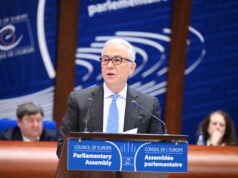WASHINGTON, DC – by Petros Kasfikis, TO VIMA –
When Congress passed the EastMed Act nearly six years ago, a senior State Department official privately expressed concern. Her objection was not to the law’s content, but to what it represented: Congress, once again, limiting the flexibility of American diplomacy. “We can never know when these restrictions will come back to haunt us,” she said.
That warning now feels prophetic. As President Recep Tayyip Erdogan stepped into the White House this week, two legislative restrictions, both linked to the F-35 fighter jet, continue to tie the president’s hands, despite his evident desire to reset relations with Ankara.
A Visit, but No Breakthrough
Diplomatic sources say the visit helped thaw the freeze in U.S.–Turkey relations that characterized the Biden years. Yet beyond warm words and displays of personal rapport, there is little sign of tangible progress toward restoring Turkey’s place in the F-35 program.
While personally inclined to resolve the issue, President Trump soon recognized its complexity. Two separate congressional firewalls, the Countering America’s Adversaries Through Sanctions Act (CAATSA) and a 2020 amendment to the National Defense Authorization Act (NDAA), pose substantial hurdles to moving forward without congressional cooperation.
The Twin Legal Barriers
The CAATSA sanctions were imposed on Turkey’s defense industry for purchasing Russia’s S-400 missile system. The NDAA amendment goes further, explicitly blocking any transfer of F-35s until Ankara divests from the Russian system entirely.
When Trump took office for his second term, according to people familiar with the matter, he asked the State Department’s lawyers to explore creative scenarios under which Turkey might retain the S-400s on its soil without violating U.S. law. Their conclusion was unequivocal: there is no legal path.
Together, CAATSA and the NDAA amendment function as interlocking safeguards, limiting the president’s ability to unilaterally override congressional restrictions on strategic arms transfers.
Searching for Loopholes
The White House, aware of Congress’s firm stance, has limited room to maneuver. During the meeting, Mr. Trump floated one possible concession: beginning the process to lift the CAATSA sanctions on Turkey’s defense procurement agency, an action that falls within his executive purview but would still require congressional review before taking effect.
Under the law, the president may determine that such a move serves U.S. national security interests and proceed to suspend or remove the sanctions. Lawmakers would then face a steep procedural hurdle to block the decision, as overturning it would require passing a joint resolution of disapproval, a measure that must clear both chambers and, in effect, overcome the president’s veto.
Such a move would not, by itself, restore Turkey to the F-35 program but would ease restrictions on roughly $20 billion worth of spare parts and engines. Foreign Minister Hakan Fidan has said that CAATSA-related restrictions in Congress are blocking export licenses for U.S.-made engines needed for Turkey’s Kaan fighter jet, adding that access to those components remains critical for the aircraft’s production.
Even so, Trump reportedly attached conditions. Chief among them: a halt to Turkey’s imports of Russian oil.
Congress Holds the Keys
So far, there is no indication that the White House has made any effort to persuade Congress to revise the NDAA amendment. The last known effort came in mid-2024, led by Senator Jeanne Shaheen, months before Mr. Trump returned to office.
The new NDAA is typically finalized by Christmas, leaving little time for legislative maneuvering. Unless the restriction is amended or repealed, the administration would likely remain bound by it throughout the coming year.
Greece Out of the Picture
Amid the intricate maneuvering of regional diplomacy, Greece’s concerns appear to have faded from the administration’s immediate calculus. The Biden administration had offered verbal assurances that Greece’s qualitative military edge would be preserved, but those assurances were never formalized as official U.S. policy, unlike the guarantees extended to Israel.
Nonetheless, Athens’s steady lobbying in Congress continues to yield results. Members of Congress increasingly cite Turkish overflights and violations of Greek sovereignty when debating any potential restoration of Ankara’s participation in the F-35 program.
Senator Jim Risch, the Republican chair of the Senate Foreign Relations Committee, recently made clear that his objections go beyond the S-400 issue. Kimberly Guilfoyle, the newly sworn-in U.S. ambassador to Greece, appeared to share that view in her responses during the Senate confirmation process.
According to sources, Ms. Guilfoyle is working to revive the 3+1 cooperation format between the United States, Greece, Israel, and Cyprus, starting with energy cooperation. The U.S. energy secretary, Chris Wright, is expected to visit Greece in November, and there is speculation that Ms. Guilfoyle may seek to use the occasion to reinvigorate the 3+1 framework by convening an energy-focused meeting with the respective ministers from each country.
The initiatives in Athens underscore how regional diplomacy continues to evolve, but the decisive moves still lie in Washington. For now, the White House faces the very predicament that the unnamed State Department official foresaw six years ago. Congress’s hand in foreign policy, once viewed as an obstacle, has become the determining factor in whether Turkey will have a chance to fly the F-35.
Petros Kasfikis is an accredited correspondent covering the White House, State Department, and Capitol Hill for MEGA TV and newspaper To Vima. For the latest political developments from Washington, D.C., you can subscribe to his YouTube channel: youtube.com/c/PKas?sub_confirmation=1





